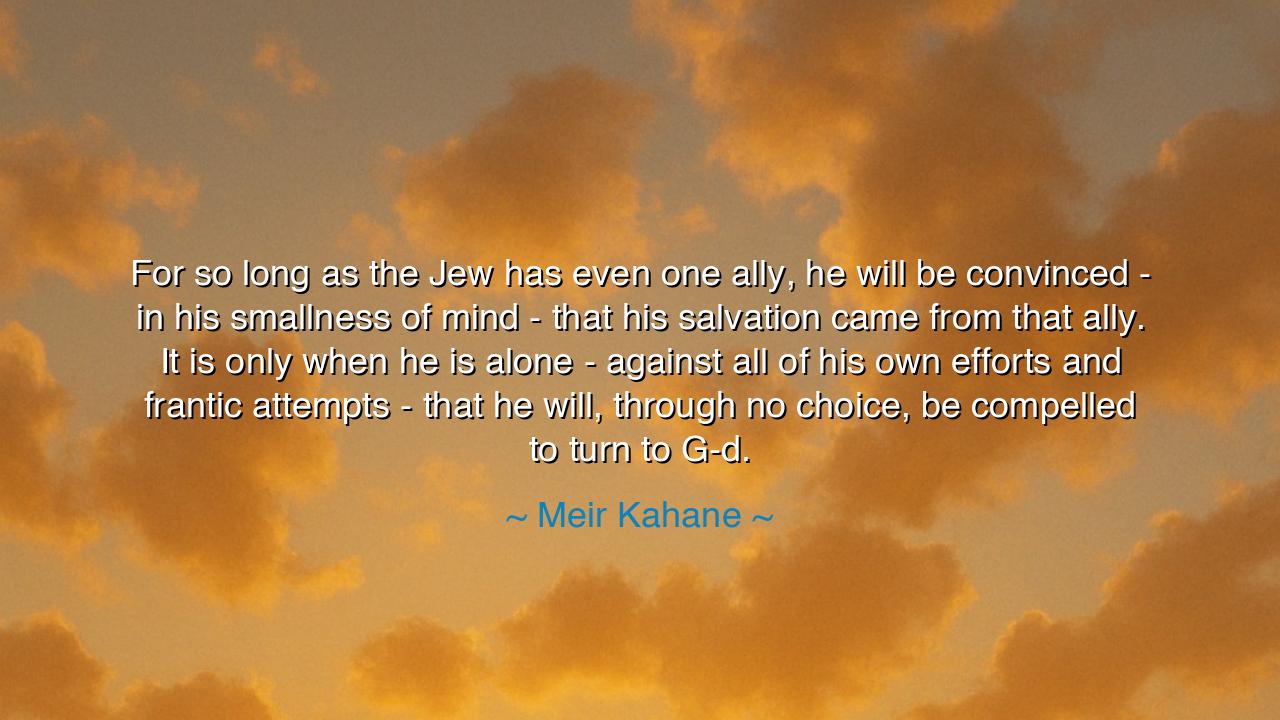
For so long as the Jew has even one ally, he will be convinced -
For so long as the Jew has even one ally, he will be convinced - in his smallness of mind - that his salvation came from that ally. It is only when he is alone - against all of his own efforts and frantic attempts - that he will, through no choice, be compelled to turn to G-d.






"For so long as the Jew has even one ally, he will be convinced - in his smallness of mind - that his salvation came from that ally. It is only when he is alone - against all of his own efforts and frantic attempts - that he will, through no choice, be compelled to turn to G-d." These powerful words from Meir Kahane touch upon the deep truth of self-reliance and the sometimes harsh journey of spiritual awakening. Kahane's message speaks to the tendency of the human spirit to rely on external forces—whether people, circumstances, or allies—when in fact the true strength and salvation lies in turning inward, toward the divine. In the face of adversity, humans often look outward for answers, yet it is only in the most desperate moments, when all external support fades away, that one is compelled to turn to a higher power. The Jew, as represented in this quote, symbolizes every soul that is caught between the temporary support of worldly alliances and the eternal refuge of spiritual faith.
The ancient sages understood that the divine does not reveal itself in times of comfort or ease, but in times of trial and solitude. In the Hebrew Bible, the story of Jacob’s wrestling with the angel reveals this truth: Jacob, who had long relied on his cunning and alliances, was forced to wrestle with his own soul in the darkness, and it was only in that moment of struggle that he was blessed and transformed. The ancient prophets were often alone, wandering in the wilderness or in the mountains, seeking not the comfort of human allies but the clarity that only comes from an authentic connection with the divine. It is in the absence of human assistance that true salvation is revealed—when one is stripped of the external distractions and is forced to face their inner self and, ultimately, turn to G-d.
Meir Kahane’s words reflect the universal human struggle to find meaning and security in the fleeting and unreliable nature of the world. To depend on allies, whether in times of political strife or personal struggle, can bring temporary comfort. But these alliances are often fleeting, unstable, and ultimately incapable of offering true salvation. When one places their trust in people, they risk falling into the trap of illusion—believing that external forces are the source of their strength, rather than recognizing that true power comes from within and from the divine relationship they cultivate. The greatest spiritual awakening often comes when a person is alone, when all other sources of help have failed, and when they must, out of necessity, turn inward and upward.
Consider the example of King David, who throughout his life faced numerous trials, from his years as a shepherd in solitude to his battles against his own enemies, and even his moments of betrayal by those closest to him. It was in the wilderness, alone, that David composed some of the most profound prayers of faith and trust in G-d. His Psalms are a testament to the power of turning to the divine when all else seems lost. Even in the darkest moments, David recognized that his salvation could not come from his military victories or political alliances, but from his relationship with G-d. He understood that spiritual reliance was the foundation of his true strength, and it was in his solitude that he truly connected with divine guidance.
Kahane’s insight about the Jew—or any person—finding salvation only when alone is a reflection of the universal path to spiritual truth. History is filled with examples of individuals who sought worldly power or alliances, only to discover that the deepest fulfillment comes from turning inward, trusting the divine, and recognizing that all external forces are but fleeting shadows. Moses, in his moment of greatest trial, when leading the Israelites through the desert, faced the crushing weight of leadership and the murmurs of doubt among his people. Yet, in his solitude on the mountain, he found clarity and guidance from G-d, reaffirming that his true strength lay not in his leadership of the people, but in his devotion to a higher power. Through these experiences, we learn that solitude, while often uncomfortable, can be the fertile ground for spiritual growth and divine connection.
The lesson from Kahane’s words is one of inner strength and spiritual resilience. We must recognize that worldly alliances and external support—though valuable—are not the ultimate source of our power. They are temporary, fragile, and ultimately beyond our control. True salvation comes not from the hands of others, but from faith and self-reliance in the divine. Just as Solomon wisely stated, "Trust in the Lord with all your heart and lean not on your own understanding," we must learn to place our trust not in fleeting alliances but in the eternal truth of our connection to the divine.
In our own lives, let us embrace moments of solitude not as burdens, but as opportunities to deepen our relationship with the divine. When we face struggles or feel alone, let us reflect on the wisdom of those who have gone before us and who, in their solitude, found their greatest strength. Let us remember that true salvation does not come from others or from the world’s fleeting comforts but from our own connection to a higher power—from the strength we draw when we turn to G-d in our deepest moments of need.






AAdministratorAdministrator
Welcome, honored guests. Please leave a comment, we will respond soon